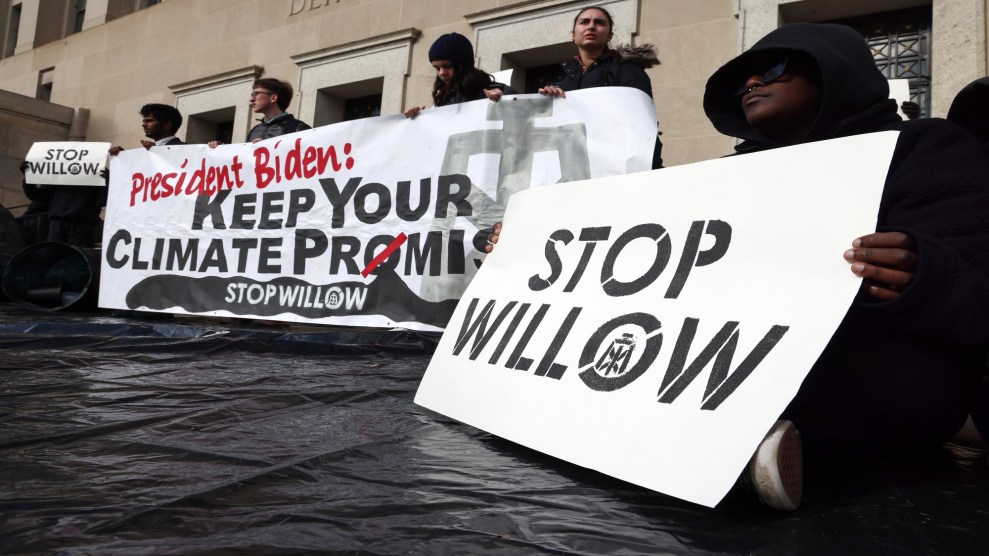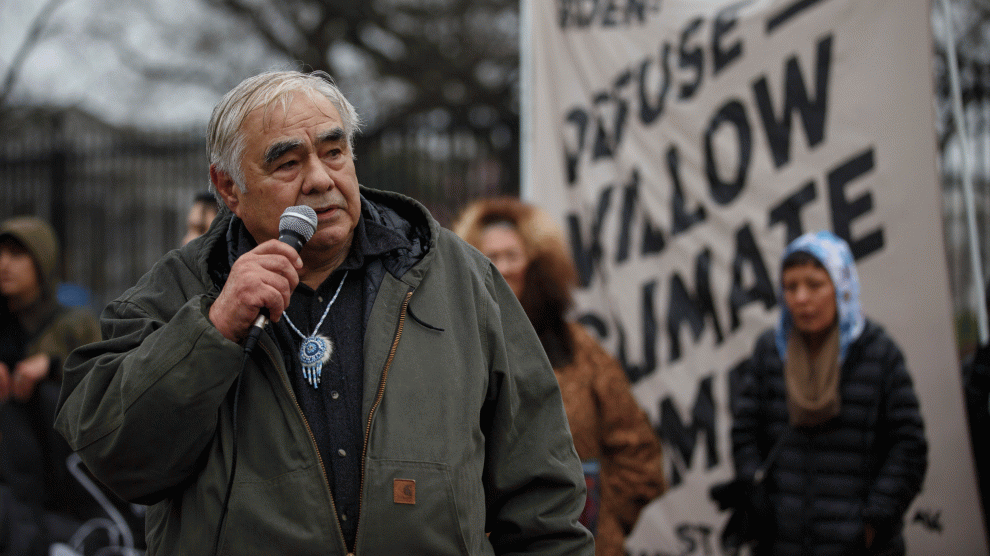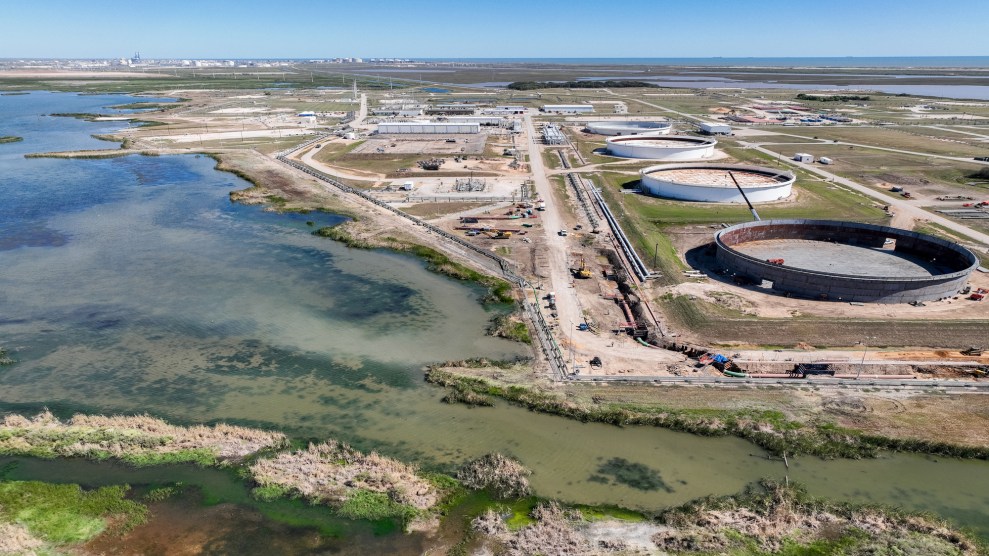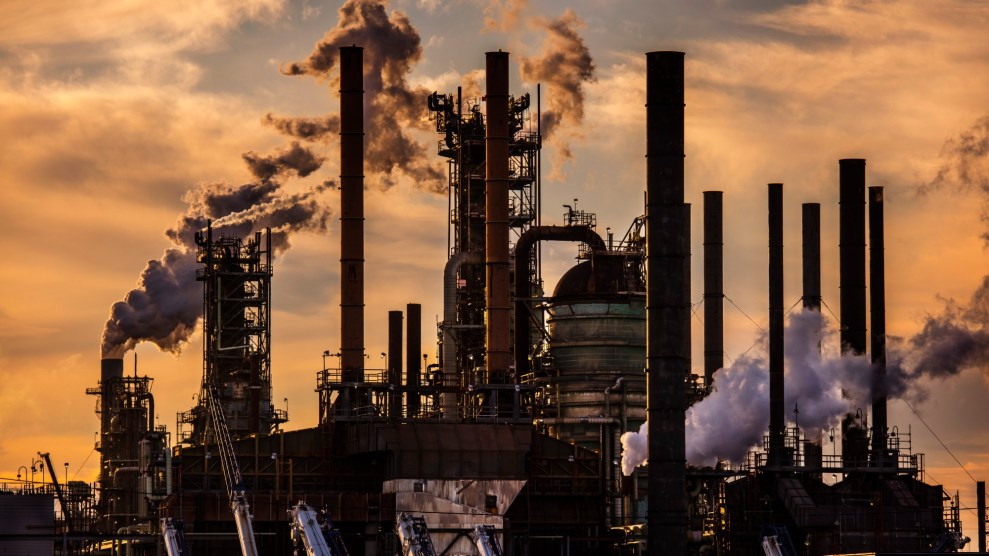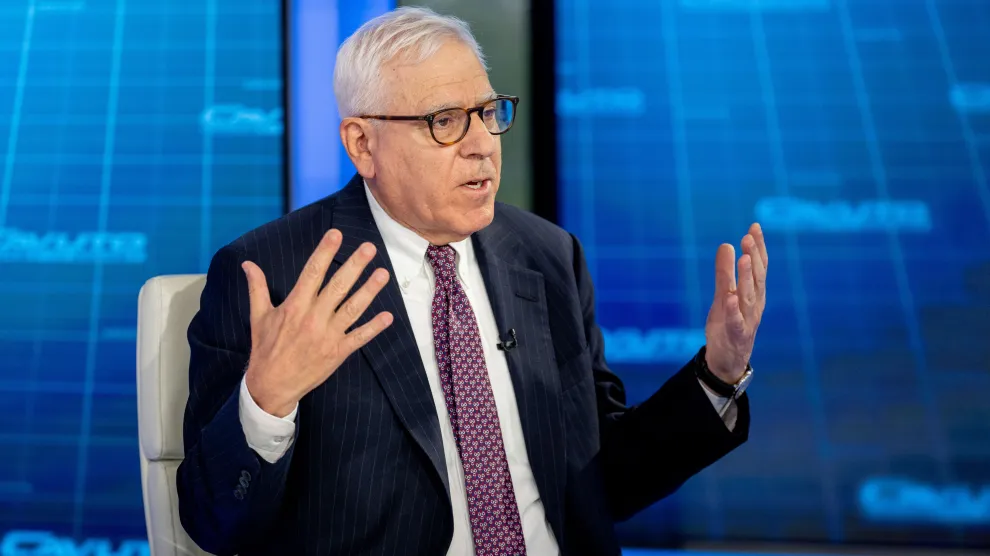
Carlyle Group co-founder David Rubenstein talks with Fox News host Neil Cavuto.Roy Rochlin/Getty
This story was originally published by the Guardian and is reproduced here as part of the Climate Desk collaboration.
A leading private equity firm that claims to be an industry climate leader in fact almost doubled its average annual greenhouse gas emissions from fossil fuel investments over the past decade, according to new research.
The Carlyle Group’s portfolio of fossil fuel companies emitted an estimated 277 million metric tons of carbon dioxide equivalent (CO2e)—a measure that includes methane and other potent global-heating gases—from 2011 to 2021, according to an investigation into the company’s energy portfolio.
The research calculates the multinational’s 10-year greenhouse gas footprint to be roughly equivalent to the “carbon bomb” that Alaska’s Willow arctic drilling project is to emit over its decades-long operation, and would take an estimated 4.6 billion new trees per decade to remove from the atmosphere.
The new research, by the Private Equity Climate Risks project, calculated Carlyle’s greenhouse gas footprint using an industry-designed tool developed by the Initiative Climat International to document direct and indirect emissions by private equity firms—having first verified which oil, gas and coal companies they back, own or invest in through publicly available information.
Carlyle’s investment portfolio contributes substantially to the global climate crisis and inflicts environmental harms most commonly in areas with large proportions of low-income and Black and brown households, according to the report, which calls on lawmakers to close regulatory loopholes and require greater transparency.
“Despite its public statements to the contrary, Carlyle is a driving force behind climate change through its substantial financing of greenhouse gas emitting sectors,” said Oscar Valdés Viera, co-author and research manager at the Americans for Financial Reform education fund. “Without meaningful regulatory oversight, private equity firms like Carlyle will continue to get away with endangering low-income and Black and brown communities, who are at greater risk from pollution and environmental harm.”
The Carlyle Group vehemently disputes the findings and methodology, claiming that it is working to decarbonize “conventional” energy firms and its latest investments in renewables are outpacing fossil fuels.
Private equity refers to an opaque form of private financing away from public, regulated markets in which funds and investors manage money for wealthy individuals and institutional investors such as university endowments and state employee pension funds. In recent years, private equity firms have become major greenhouse gas polluters, often acquiring risky oil, gas and coal projects with minimal public scrutiny or regulatory oversight—which makes verifying portfolio companies and assets extremely challenging.
Headquartered in Washington DC with more than 2,100 employees in 29 offices around the world, Carlyle is one of the pioneers of private equity, and at the end of 2022 had $373 billion of assets under management. Carlyle is listed on the NASDAQ stock exchange, so is bound by more reporting requirements than the vast majority of private equity firms.
The company began investing in renewables in 2019, and last year became the first major private equity firm to pledge to net zero emissions by 2050 (for some of its portfolio). The firm has been promoting its climate credentials by claiming to “drive positive change” with “activities grounded in driving real emission reductions.”
Yet at the end of 2022, fossil fuels accounted for 94 percent of its energy portfolio, including oil and gas operations based in Texas, Massachusetts, Romania, and Switzerland, according to the report, “The Carlyle Group’s Hidden Climate Impact.”
For every dollar invested in renewable energy sources like solar and wind, Carlyle invests $16 in fossil fuel operations like pipelines, oil and fracking wells, and power plants, according to the consortium of researchers—who told the Guardian that their calculations were based on “conservative emissions estimates” disclosed by the company.
The private equity industry manages about $11 trillion globally. Asset managers and funds buy and restructure companies including startups, franchises, troubled businesses and real estate operations using their clients’ money. Yet unlike banks and other publicly listed companies, private equity firms are exempt from most financial disclosure rules, making it extremely difficult to track their assets—or risks.
It means people such as firefighters, nurses and teachers whose pensions are invested in private equity funds have little way of knowing if their retirement nest egg is financing police surveillance equipment, hospitals, leaky pipelines, or coal plants.
As publicly listed banks, universities and energy companies have come under growing pressure from shareholders and environmental advocates to divest from fossil fuels, rather than phasing out or retiring polluting projects, some have turned to private equity as a source of last-ditch capital.
Since 2010, the industry has invested at least $1.1 trillion in energy projects globally—mostly in companies engaged in the exploration, extraction, transportation, storage, processing and burning of oil, coal and gas.
The report argues that Carlyle’s energy portfolio stands out as particularly dirty: between 2011 and 2021, 90 percent of the estimated 91 energy companies Carlyle backed were fossil fuel operations. As a result, greenhouse gas emissions from the company’s energy portfolio increased by 95 percent on average annually, researchers found. The company’s greenhouse gas footprint was about equivalent to the 2021 emissions of several large countries including Ukraine, Pakistan, Spain, or Nigeria.
And it’s paid off: Despite accounting for only 6 percent of total assets under management, energy investments generated around half of the firm’s overall profits in 2022, mainly thanks to $660 million from NGP Energy Capital Management—also known as NGP or Natural Gas Partners.
NGP, also a private equity firm, owns portions of at least a dozen fossil fuel companies, but which Carlyle does not include in its emissions disclosures, due to a “different business model”—an accounting strategy described by some experts as “slippery ethics.” Carlyle has held a majority stake in NGP since 2012, according to its own Securities and Exchange Commission filing, but insists that it does not control or manage or have board oversight of the company.
